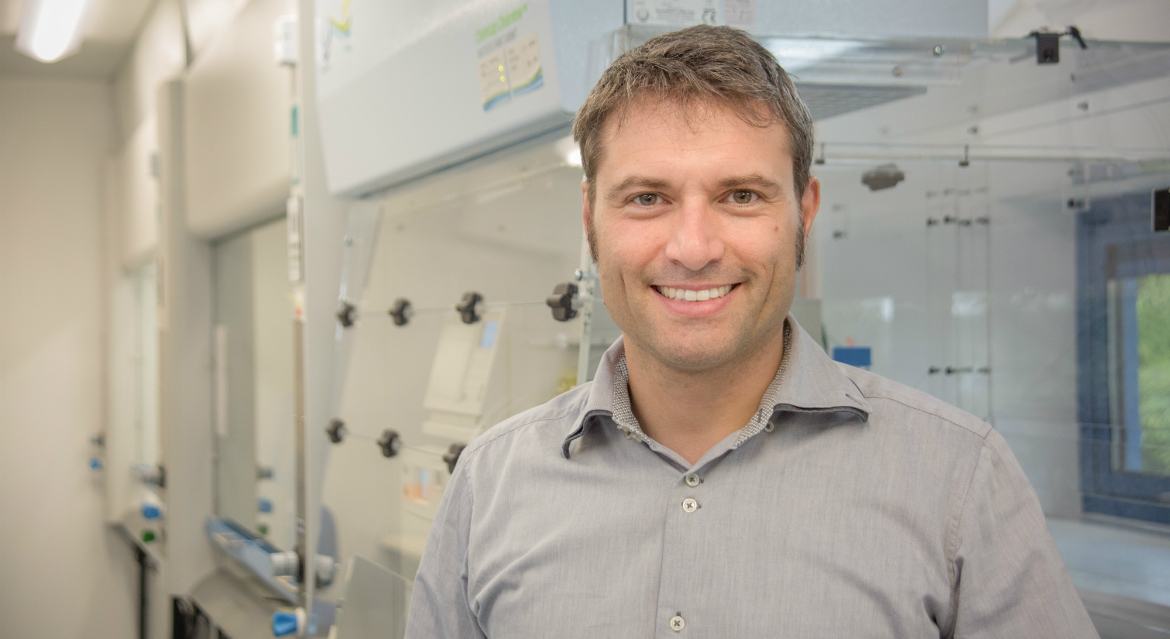University and Boehringer Ingelheim collaborate for free access of PROTAC compound
Published On Mon 7 Jan 2019 by Roddy Isles

- Boehringer Ingelheim to make BET degrader compound MZ 1 available through its opnMe.com portal
- Support of open access to boost progress in biomedical and drug discovery research
- MZ 1 compound created at the University of Dundee is the first external compound to be added to Boehringer Ingelheim’s’ opnMe.com portal
A PROTAC COMPOUND developed at the University of Dundee is being made available free of charge by the pharmaceutical company Boehringer Ingelheim through their scientific crowdsourcing platform opnMe.com. The opnMe portal provides free and open access to selected molecules for the scientific community aiming at accelerating research initiatives that can benefit patients with high unmet medical need.
MZ 1 is a benchmark molecule, one of a new class of `PROTAC degraders’, which has helped to open up new research in therapeutic areas as diverse as oncology, immunology and respiratory diseases. This particular compound triggers the intracellular destruction of BET proteins, inducing preferential removal of BRD4 over BRD2 and BRD3 in cells.
PROTACs (PROteolysis TArgeting Chimeric molecules) are designed to harness the cell’s natural disposal system (the ubiquitin-proteasome) to specifically remove disease-causing proteins. They do this by triggering the labelling of these as “expired” proteins, which the proteasome then removes. This opens up new opportunities to target disease mechanisms that have been difficult to reach.
Professor Alessio Ciulli has led the development and characterisation of MZ 1 at his laboratory in the School of Life Sciences at the University of Dundee. He said, “This is a major decision by Boehringer Ingelheim that will benefit scientific research and help us get closer to our ultimate aim of drugging what was previously considered undruggable, providing the opportunity to create new drugs to treat some terrible diseases.”
By making the compound freely available on their opnMe.com portal, Boehringer Ingelheim is providing a tool to researchers around the world which will make it easier and quicker to develop experiments that could, in the end, benefit patients with high unmet medical need.
Professor Ciulli said, “There is already more and more research taking place in the area of PROTACs and making the compound available in this way will enable many cell biologists, cancer biologists and drug discoverers alike to carry out experiments they would not have been able to pursue previously.”
Professor Ciulli and colleagues at Dundee first disclosed MZ 1 in 2015, revealing the potential to offer a super-targeted method of destroying unwanted proteins. In 2017, they provided the field with the first ever crystal structure of a PROTAC ternary complex. This breakthrough discovery revealed the molecular detail of how MZ 1 acts as a degrader, causing neutralising proteins to bind tightly to their bad neighbour and act against it, starting a cascade process of degradation. More recent work by Professor Ciulli and colleagues has further characterised the cellular activity and mode of action of MZ 1, also in vivo.
Boehringer Ingelheim has worked in collaboration with Professor Ciulli’s lab at the University of Dundee since 2016 with the aim to develop a novel class of medicines that target disease-causing proteins for degradation.
The collaboration brings together the expertise of Professor Ciulli, one of the pioneers in the field of PROTACs, with Boehringer Ingelheim’s expertise in drug discovery and clinical development of new therapeutic agents.
For media enquiries contact:
Roddy Isles
Head of Corporate Communications
University of Dundee
Nethergate, Dundee, DD1 4HN
Tel: +44 (0)1382 384910
Mobile: 07800 581902
Email: r.isles@dundee.ac.uk